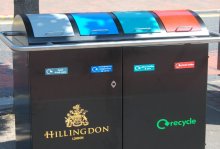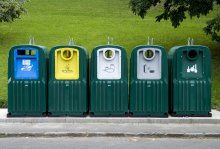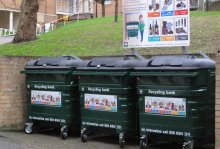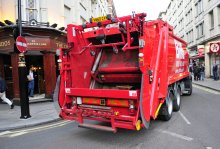Landfill Processing In English
 Over the years, the amount of recycled debris in Britain has increased from 11 per cent to 40 per cent. We have found out why the United Kingdom is setting chips in garbage cans, what a fine can be paid for the wrong sorting of garbage, and what example does the people of the Buckingham Palace.
Over the years, the amount of recycled debris in Britain has increased from 11 per cent to 40 per cent. We have found out why the United Kingdom is setting chips in garbage cans, what a fine can be paid for the wrong sorting of garbage, and what example does the people of the Buckingham Palace.
Classification rules
The English were not immediately accustomed to the separate collection of waste, and for a long time, Britain among the countries of the European Union had occupied one of the most recent sites for recycling.
In England, only 18 per cent of waste was disposed of, while in the Netherlands it was 65 per cent and in Germany it was 58 per cent. But the government failed and did everything in its power to ensure that the British people properly sorted the trash.
 The people of the Kingdom now distribute it in three tanks: the first for organic and digestive waste, the second collects all recycled debris (boom, plastic, glass) and the third container sends items that cannot be processed.
The people of the Kingdom now distribute it in three tanks: the first for organic and digestive waste, the second collects all recycled debris (boom, plastic, glass) and the third container sends items that cannot be processed.
Dividing rules may vary slightly across counties. For example, in some parts of Britain Organic waste You need to put in a special biodegradable bag. In other parts of the country, the owners of private houses must have a separate garden garbage can, where they throw branches, weeds, dry flowers.
A great example for British people is the royal family: in the Buckingham Palace, 99 per cent of clean waste (base, dry and running) is being processed directly in the field. There are branches and bitches from the Kensington Palace parks, Malborough House and St. James Palace. Then all the garden garbage passes through the shredder so it can become a compost faster.
Then all the garden garbage passes through the shredder so it can become a compost faster.
In major cities, for example, London has containers that can sell old clothes, toys, household equipment, mobile phones, batteries. Typically, these tanks are installed in every area of the city, most often near the major supermarkets.
Books on garbage collection
In order to understand what kind of bag to throw away, the people of the country are distributing special leaflets on how to sort debris. These measures have yielded results: if only 11 to 18 per cent of the waste has previously been processed by England, more than 40 per cent of the waste is now in the secondary.
Such civic consciousness is difficult to develop in one decade. Therefore, they teach the inhabitants of the country to separate the collection of rubber debris: non-traditional landlords who do not sort waste are severely fined.




Related posts:
 In the Volgograd Region Administration, a concession agreement was signed on public utilities, recycling, disposal (storage) of solid household waste. According…
In the Volgograd Region Administration, a concession agreement was signed on public utilities, recycling, disposal (storage) of solid household waste. According… The building is already over, and a bunch of building debris and waste remains lying, rather than seriously ruining the type of capital. As a result, today the required…
The building is already over, and a bunch of building debris and waste remains lying, rather than seriously ruining the type of capital. As a result, today the required… I ve done a lot of franchise monitors, but I ve got the usual bids, a cafe or a store that s already starting to compete with me, I thought I was bored, telling…
I ve done a lot of franchise monitors, but I ve got the usual bids, a cafe or a store that s already starting to compete with me, I thought I was bored, telling… What are the rules for sorting debris on French Riviera? When we rented an apartment in Paris, there were a few large tanks in the interior courtyard where classic…
What are the rules for sorting debris on French Riviera? When we rented an apartment in Paris, there were a few large tanks in the interior courtyard where classic… Is discipline important in investing? Without any doubt it is true! A disciplined investor will never buy securities without serious analysis or pay attention to…
Is discipline important in investing? Without any doubt it is true! A disciplined investor will never buy securities without serious analysis or pay attention to… Structural debris: brick, brisket, concrete, stoves obtained during the dismantling of construction sites are transformed into a secondary building block on GOST…
Structural debris: brick, brisket, concrete, stoves obtained during the dismantling of construction sites are transformed into a secondary building block on GOST… Professional presentation demands more than just content - it requires the right display platform. The Black Easel stands out as a sophisticated solution for artists…
Professional presentation demands more than just content - it requires the right display platform. The Black Easel stands out as a sophisticated solution for artists… An incineration factory in the heart of Vienna is unique not only because it does not completely damage the environment, but it also, unlike its collars, decorates…
An incineration factory in the heart of Vienna is unique not only because it does not completely damage the environment, but it also, unlike its collars, decorates… The Territorial Waste Management Scheme was held by the Parliamentary Hearings at Medoldum Parliamentary hearings of the Regional Waste Management Scheme were held…
The Territorial Waste Management Scheme was held by the Parliamentary Hearings at Medoldum Parliamentary hearings of the Regional Waste Management Scheme were held… Environmentally sound behaviour is very often consistent with the principles of rationality, servitude, prudential treatment of purchases, by their time, to environmental…
Environmentally sound behaviour is very often consistent with the principles of rationality, servitude, prudential treatment of purchases, by their time, to environmental…